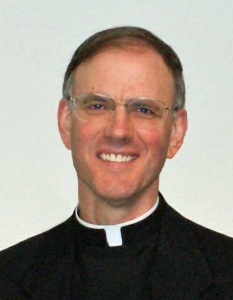“What’s a Person to Do? Everyday Decisions That Matter” is an important work for those who seek to navigate through life’s 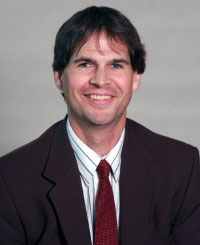 daily choices. Dr. Mark Latkovic, who is a professor of moral and systematic theology at Sacred Heart Major Seminary in Detroit, Michigan, does a fantastic job bringing forward basic principles that should be a part of our discernment process in making decisions.- especially when there is no definitive Catholic teaching on a subject. Applying those principles, he then takes a look at 40 different questions and answers. Whether it’s areas of Facebook and Internet interaction, purchasing lottery tickets or giving to particular “charities”, or how we deal with decisions for children and for elderly parents, Dr. Latkovic challenges us to ask important questions and respond to issues with moral virtue. With an engaging and accessible writing style, Dr. Latkovic provides an important resource for us all.
daily choices. Dr. Mark Latkovic, who is a professor of moral and systematic theology at Sacred Heart Major Seminary in Detroit, Michigan, does a fantastic job bringing forward basic principles that should be a part of our discernment process in making decisions.- especially when there is no definitive Catholic teaching on a subject. Applying those principles, he then takes a look at 40 different questions and answers. Whether it’s areas of Facebook and Internet interaction, purchasing lottery tickets or giving to particular “charities”, or how we deal with decisions for children and for elderly parents, Dr. Latkovic challenges us to ask important questions and respond to issues with moral virtue. With an engaging and accessible writing style, Dr. Latkovic provides an important resource for us all.
[powerpress]
You can find the book here
This wonderful little book is a bracing wake-up call to those of us who often overlook the moral dimensions of the decisions we make in everyday life. Mark Latkovic not only wakes us up, but gently guides us through the ethical minefield of contemporary society. —Mary Ann Glendon, Learned Hand Professor of Law at Harvard Law School
This little gem of a book is not only a reliable guide to resolving some of the ethical questions we face in our everyday lives, it is a guidebook to thinking well about decisions that shape our characters. It provides answers to specific ethical problems, but that is only part of the story. What Professor Latkovic is doing is teaching us by example how to think deeply and well about the moral dimensions of our lives. —Robert P. George, McCormick Professor of Jurisprudence, Princeton University
Tags: choices, Harvard Law School, Mark Latkovic, virtue, work
This entry was posted on Wednesday, October 30th, 2013 at 1:05 pm
You can follow any responses to this entry through the RSS 2.0 feed.
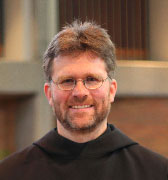 Episode 9- Â The Holy Rule of St. Benedict: A Spiritual Path for Today’s World with Fr. Mauritius Wilde O.S.B., PhD.
Episode 9- Â The Holy Rule of St. Benedict: A Spiritual Path for Today’s World with Fr. Mauritius Wilde O.S.B., PhD.
In place of idleness, work
[powerpress]
From the Holy Rule of St. Benedict:
CHAPTER XLVIII
Of the Daily Work
Idleness is the enemy of the soul; and therefore the brethren ought to be employed in manual labor at certain times, at others, in devout reading. Hence, we believe that the time for each will be properly ordered by the following arrangement; namely, that from Easter till the calends of October, they go out in the morning from the first till about the fourth hour, to do the necessary work, but that from the fourth till about the sixth hour they devote to reading. After the sixth hour, however, when they have risen from table, let them rest in their beds in complete silence; or if, perhaps, anyone desireth to read for himself, let him so read that he doth not disturb others. Let None be said somewhat earlier, about the middle of the eighth hour; and then let them work again at what is necessary until Vespers.
If, however, the needs of the place, or poverty should require that they do the work of gathering the harvest themselves, let them not be downcast, for then are they monks in truth, if they live by the work of their hands, as did also our forefathers and the Apostles. However, on account of the faint-hearted let all things be done with moderation.
From the calends of October till the beginning of Lent, let them apply themselves to reading until the second hour complete. At the second hour let Tierce be said, and then let all be employed in the work which hath been assigned to them till the ninth hour. When, however, the first signal for the hour of None hath been given, let each one leave off from work and be ready when the second signal shall strike. But after their repast let them devote themselves to reading or the psalms.
During the Lenten season let them be employed in reading from morning until the third hour, and till the tenth hour let them do the work which is imposed on them. During these days of Lent let all received books from the library, and let them read them through in order. These books are to be given out at the beginning of the Lenten season.
Above all, let one or two of the seniors be appointed to go about the monastery during the time that the brethren devote to reading and take notice, lest perhaps a slothful brother be found who giveth himself up to idleness or vain talk, and doth not attend to his reading, and is unprofitable, not only to himself, but disturbeth also others. If such a one be found (which God forbid), let him be punished once and again. If he doth not amend, let him come under the correction of the Rule in such a way that others may fear. And let not brother join brother at undue times.
On Sunday also let all devote themselves to reading, except those who are appointed to the various functions. But if anyone should be so careless and slothful that he will not or cannot meditate or read, let some work be given him to do, that he may not be idle.
Let such work or charge be given to the weak and the sickly brethren, that they are neither idle, nor so wearied with the strain of work that they are driven away. Their weakness must be taken into account by the Abbot.
Father Mauritius Wilde, OSB, Ph.D., did his philosophical, theological and doctoral studies in Europe. He is the author of several books and directs retreats regularly. He serves as Prior of our monastery in Schuyler.
 For more information about the ministry of the the Missionary Benedictines of Christ the King Priory in Schuyler, Nebraska visit here:
For more information about the ministry of the the Missionary Benedictines of Christ the King Priory in Schuyler, Nebraska visit here:
Tags: Daily Work, silence, truth, work
This entry was posted on Tuesday, October 29th, 2013 at 10:51 am
You can follow any responses to this entry through the RSS 2.0 feed.
THE WAY OF PERFECTION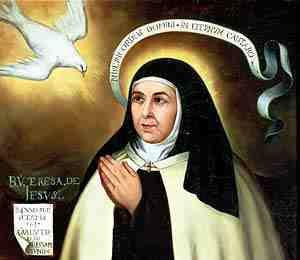
By
St. Teresa of Avila
Chapter 3
[powerpress]
For the pdf containing the complete text and footnotes click here
Continues the subject begun in the first chapter and persuades the sisters to busy themselves constantly in beseeching God to help those who work for the Church. Ends with an exclamatory prayer.
For other audio chapters of
“The Way of Perfection”
THE WAY OF PERFECTION
by
ST. TERESA OF AVILA
Translated & Edited by
E. ALLISON PEERS
from the Critical Editon of
P. SILVERIO DE SANTA TERESA, C.D.
Tags: audio, Critical Editon, prayer, st, work
This entry was posted on Friday, October 25th, 2013 at 1:49 pm
You can follow any responses to this entry through the RSS 2.0 feed.
Episode 5 – Regnum Novum: Bringing forth the New Evangelization through Catholic Social Teaching with Omar Guiterrez - Value 4 Truth, Freedom, Justice, and Love part 2 “Justice”
-Â Value 4 Truth, Freedom, Justice, and Love part 2 “Justice”
[powerpress]
From episode 5… Truth, Freedom, Justice, and Love part 2Â “Justice”
These are the four values of the Social Teaching of the Catholic Church as they’re enumerated in the Compendium and as they were laid out by, again, Blessed Pope John XXIII in Mater et magistra and Pacem in terris. Without these values, the work of social justice becomes an albatross around our necks. It pulls us down, threatening to poison all the work we do, no matter how well intentioned.
Justice requires we know what is due to our neighbor. But even when justice is achieved, it can be cold and impersonal, as Pope John Paul II said. This is why the phrase “social justice†appears so rarely in the Church’s Social Teaching. Justice is the bare minimum, and we are not looking for the minimum.
((Truth, Freedom and Love are covered in other episodes)
We live at a very special time. The confluence of many things has brought forth the clear need to be able to articulate the Social Teaching of the Catholic Church in a way that is accessible and applicable. This is not to be an effort where high-minded theories are to be bandied about. Rather, this is a time of opportunity wherein we can apply the Social Doctrine to the concrete so as to bring about a New Kingdom, a Revolution. – Omar G.Â
Discerning Hearts is blessed to present Omar F. A. Guiterrez, M.A. , Special Assistant  to Archbishop George Lucas of the Archdiocese of Omaha, in a groundbreaking series which breaks open the heart of Catholic Social Doctrine.
Tags: freedom, social doctrine, social justice, Social Teaching, truth, work
This entry was posted on Wednesday, October 9th, 2013 at 12:57 am
You can follow any responses to this entry through the RSS 2.0 feed.
Episode 4 – Regnum Novum: Bringing forth the New Evangelization through Catholic Social Teaching with Omar Guiterrez - Value 4 Truth, Freedom, Justice, and Love part 1 “Truth and Freedom”
-Â Value 4 Truth, Freedom, Justice, and Love part 1 “Truth and Freedom”
[powerpress]
From episode … 4. Truth, Freedom, Justice, and Love part 1Â “Truth and Freedom”
These are the four values of the Social Teaching of the Catholic Church as they’re enumerated in the Compendium and as they were laid out by, again, Blessed Pope John XXIII in Mater et magistra and Pacem in terris. Without these values, the work of social justice becomes an albatross around our necks. It pulls us down, threatening to poison all the work we do, no matter how well intentioned.
When charity lacks truth, as Pope Benedict XVI states, it can be filled with every whim and agenda and becomes the opposite of itself. Truth is the truth of the fundamental dignity of the human person, a dignity we can only fully appreciate in the encounter with Christ.
A freedom that requires self-destruction is no freedom at all. Authentic freedom is the ability to do what is good, but this requires that we know the truth about the good.
(Justice and Love covered in next episode)
We live at a very special time. The confluence of many things has brought forth the clear need to be able to articulate the Social Teaching of the Catholic Church in a way that is accessible and applicable. This is not to be an effort where high-minded theories are to be bandied about. Rather, this is a time of opportunity wherein we can apply the Social Doctrine to the concrete so as to bring about a New Kingdom, a Revolution. – Omar G.Â
Discerning Hearts is blessed to present Omar F. A. Guiterrez, M.A. , Special Assistant  to Archbishop George Lucas of the Archdiocese of Omaha, in a groundbreaking series which breaks open the heart of Catholic Social Doctrine.
Tags: freedom, Social Teaching, truth, work
This entry was posted on Tuesday, October 1st, 2013 at 9:52 am
You can follow any responses to this entry through the RSS 2.0 feed.
Dr. Matthew Bunson discusses the life, times and work of  St. Ephrem of Syria
[powerpress]
For more on St. Ephrem and his teachings
- Nisibene Hymns  - Miscellaneous Hymns —
On the Nativity of Christ in the Flesh,
For the Feast of the Epiphany, and
On the Faith (“The Pearl”)Â Â -Â Homilies —
On Our Lord, On Admonition and Repentance,
and On the Sinful Woman
The figure of Ephrem is still absolutely timely for the life of the various Christian Churches. We discover him in the first place as a theologian who reflects poetically, on the basis of Holy Scripture, on the mystery of man’s redemption brought about by Christ, the Word of God incarnate. His is a theological reflection
expressed in images and symbols taken from nature, daily life and the Bible. Ephrem gives his poetry and liturgical hymns a didactic and catechetical character: they are theological hymns yet at the same time suitable for recitation or liturgical song. On the occasion of liturgical feasts, Ephrem made use of these hymns to spread Church doctrine. Time has proven them to be an extremely effective catechetical instrument for the Christian community.
Ephrem’s reflection on the theme of God the Creator is important: nothing in creation is isolated and the world, next to Sacred Scripture, is a Bible of God. By using his freedom wrongly, man upsets the cosmic order. The role of women was important to Ephrem. The way he spoke of them was always inspired with sensitivity and respect: the dwelling place of Jesus in Mary’s womb greatly increased women’s dignity. Ephrem held that just as there is no Redemption without Jesus, there is no Incarnation without Mary. The divine and human dimensions of the mystery of our redemption can already be found in Ephrem’s texts; poetically and with fundamentally scriptural images, he anticipated the theological background and in some way the very language of the great Christological definitions of the fifth-century Councils.
Ephrem, honoured by Christian tradition with the title “Harp of the Holy Spirit”, remained a deacon of the Church throughout his life. It was a crucial and emblematic decision: he was a deacon, a servant, in his liturgical ministry, and more radically, in his love for Christ, whose praises he sang in an unparalleled way, and also in his love for his brethren, whom he introduced with rare skill to the knowledge of divine Revelation.
For more visit Vatican.va
Dr. Matthew Bunson, Senior Fellow of the St. Paul Center for Biblical Theology, is one of the United States’ leading authorities on the papacy and the Church.
His books include: The Encyclopedia of Catholic History; The Encyclopedia of Saints; Papal Wisdom; All Shall Be Well; Encyclopedia of the Roman Empire; and The Angelic Doctor: The Life and World of St. Thomas Aquinas; The Pope Encyclopedia; We Have a Pope! Benedict XVI, the first Catholic biography of the Holy Father in the English language; the Encyclopedia of U.S. Catholic History; Pope Francis. Â His also the editor of OSV’s “The Catholic Answer” magazine.
Tags: Church, matthew bunson, Syria, work
This entry was posted on Monday, September 23rd, 2013 at 11:25 am
You can follow any responses to this entry through the RSS 2.0 feed.
Episode 3 – Regnum Novum: Bringing forth the New Evangelization through Catholic Social Teaching with Omar Guiterrez - Value # 3 – Look , Judge, Act
- Value # 3 – Look , Judge, Act
[powerpress]
From episode 3 Â Â Â Look , Judge, Act
Blessed Pope John XXIII gave us this practical suggestion in his letter Mater et magistra. The Social Doctrine provides us with principles for reflection, criteria for judgment, and directives for action. Social justice is supposed to be lived out in our every day. That’s the point, and so this Holy Father gave us the paradigm.
Look at the world around you, that which is most immediate to you. Start with your family. Proceed to your culture. Witness the social and economic realities/policies near you. Know the political landscape of your city, county, state, and nation. See your neighbors close at hand and around the world. Use the principles of the Social Teaching as you look so that you know what to look for.
Judge what is best for the family, for the culture, for the society and the economy, for the state, for the world. Use the criteria provided by the Social Doctrine. What is missing? Why is it missing? What can be done?
Act on it. You’re a lay person with as real an obligation to evangelization as any priest. Do something in the world so as to make it’s semblance more like that which the Lord desires. Volunteer. Participate. Pray. Do not let some tell you that prayer is not action. Pray. You can pray and raise good children.
We live at a very special time. The confluence of many things has brought forth the clear need to be able to articulate the Social Teaching of the Catholic Church in a way that is accessible and applicable. This is not to be an effort where high-minded theories are to be bandied about. Rather, this is a time of opportunity wherein we can apply the Social Doctrine to the concrete so as to bring about a New Kingdom, a Revolution. – Omar G.Â
Discerning Hearts is blessed to present Omar F. A. Guiterrez, M.A. , Special Assistant  to Archbishop George Lucas of the Archdiocese of Omaha, in a groundbreaking series which breaks open the heart of Catholic Social Doctrine.
Tags: family, lay person, New Kingdom, social doctrine, Social Teaching, social work, special time, work
This entry was posted on Tuesday, September 17th, 2013 at 9:26 am
You can follow any responses to this entry through the RSS 2.0 feed.
[powerpress]

Born: 310 AD,
Died: May 2, 367 AD
For more on St. Hilary of Poitiers and his teachings
Hilary of Poitiers
-Â On the Councils, or the Faith of the Easterns
-Â On the Trinity
-Â Homilies on the Psalms
To sum up the essentials of his doctrine, I would like to say that Hilary found the starting point for his theological reflection in baptismal faith. In De Trinitate, Hilary writes: Jesus
“has commanded us to baptize in the name of the Father and of the Son and of the Holy Spirit (cf. Mt 28: 19), that is, in the confession of the Author, of the Only-Begotten One and of the Gift. The Author of all things is one alone, for one alone is God the Father, from whom all things proceed. And one alone is Our Lord Jesus Christ, through whom all things exist (cf. I Cor 8: 6), and one alone is the Spirit (cf. Eph 4: 4), a gift in all…. In nothing can be found to be lacking so great a fullness, in which the immensity in the Eternal One, the revelation in the Image, joy in the Gift, converge in the Father, in the Son and in the Holy Spirit” (De Trinitate 2, 1). God the Father, being wholly love, is able to communicate his divinity to his Son in its fullness. I find particularly beautiful the following formula of St Hilary: “God knows not how to be anything other than love, he knows not how to be anyone other than the Father. Those who love are not envious and the one who is the Father is so in his totality. This name admits no compromise, as if God were father in some aspects and not in others” (ibid., 9, 61).
For this reason the Son is fully God without any gaps or diminishment. “The One who comes from the perfect is perfect because he has all, he has given all” (ibid., 2, 8). Humanity finds salvation in Christ alone, Son of God and Son of man. In assuming our human nature, he has united himself with every man, “he has become the flesh of us all” (Tractatus super Psalmos 54, 9); “he took on himself the nature of all flesh and through it became true life, he has in himself the root of every vine shoot” (ibid., 51, 16). For this very reason the way to Christ is open to all – because he has drawn all into his being as a man -, even if personal conversion is always required: “Through the relationship with his flesh, access to Christ is open to all, on condition that they divest themselves of their former self (cf. Eph 4: 22), nailing it to the Cross (cf. Col 2: 14); provided we give up our former way of life and convert in order to be buried with him in his baptism, in view of life (cf. Col1: 12; Rom 6: 4)” (ibid., 91, 9).
Fidelity to God is a gift of his grace. Therefore, St Hilary asks, at the end of his Treatise on the Trinity, to be able to remain ever faithful to the baptismal faith. It is a feature of this book: reflection is transformed into prayer and prayer returns to reflection. The whole book is a dialogue with God.
I would like to end today’s Catechesis with one of these prayers, which thus becomes our prayer:
“Obtain, O Lord”, St Hilary recites with inspiration, “that I may keep ever faithful to what I have professed in the symbol of my regeneration, when I was baptized in the Father, in the Son and in the Holy Spirit. That I may worship you, our Father, and with you, your Son; that I may deserve your Holy Spirit, who proceeds from you through your Only Begotten Son… Amen” (De Trinitate 12, 57).
For more visit Vatican.va
Dr. Matthew Bunson, Senior Fellow of the St. Paul Center for Biblical Theology, is one of the United States’ leading authorities on the papacy and the Church.
His books include: The Encyclopedia of Catholic History; The Encyclopedia of Saints; Papal Wisdom; All Shall Be Well; Encyclopedia of the Roman Empire; and The Angelic Doctor: The Life and World of St. Thomas Aquinas; The Pope Encyclopedia; We Have a Pope! Benedict XVI, the first Catholic biography of the Holy Father in the English language; the Encyclopedia of U.S. Catholic History; Pope Francis. Â His also the editor of OSV’s “The Catholic Answer” magazine.
Tags: alone, Church, matthew bunson, work
This entry was posted on Friday, September 13th, 2013 at 9:36 am
You can follow any responses to this entry through the RSS 2.0 feed.
Episode 2 – Regnum Novum: Bringing forth the New Evangelization through Catholic Social Teaching with Omar Guiterrez - Value # 2 – Communion not opposition
- Value # 2 – Communion not opposition
[powerpress]
From episode 2. Â Â Â Communion not opposition
As I say in some of my posts, there is a spirit of opposition in a good deal of the social work that happens today. The corruption of workers’ unions is one of the great tragedies of our day. Imagine what great work they could do on top of the many achievements they’ve made. But they do not universally do great work because they are caught up in the oppositionist paradigms that make integral human development impossible.
True social justice requires that we drop these paradigms of opposition: management vs. labor; bourgeois vs. proletariat; state vs. individual. We own the great Catholic both/and. It applies to the Social Teaching of the Catholic Church more than ever.
We live at a very special time. The confluence of many things has brought forth the clear need to be able to articulate the Social Teaching of the Catholic Church in a way that is accessible and applicable. This is not to be an effort where high-minded theories are to be bandied about. Rather, this is a time of opportunity wherein we can apply the Social Doctrine to the concrete so as to bring about a New Kingdom, a Revolution. – Omar G.Â
Discerning Hearts is blessed to present Omar F. A. Guiterrez, M.A. , Special Assistant  to Archbishop George Lucas of the Archdiocese of Omaha, in a groundbreaking series which breaks open the heart of Catholic Social Doctrine.
Tags: New Kingdom, social doctrine, social work, work
This entry was posted on Tuesday, September 10th, 2013 at 8:18 am
You can follow any responses to this entry through the RSS 2.0 feed.
Dr. Matthew Bunson discusses the life, times and work of  St. Athanasius of Alexandria
[powerpress]
For more on St. Athanasius of Alexandria and his teachings
AthanasiusÂ
-Â On the Incarnation of the Word
-Â Deposition of Arius
-Â Statement of Faith
-Â On Luke 10:22 (Matthew 11:27)
-Â Circular Letter
-Â Apologia Contra Arianos
-Â De Decretis
-Â De Sententia Dionysii
-Â Vita S. Antoni (Life of St. Anthony)
-Â Ad Episcopus Aegypti et Libyae
-Â Apologia ad Constantium
-Â Apologia de Fuga
-Â Historia Arianorum
-Â Four Discourses Against the Arians
-Â De Synodis
-Â Tomus ad Antiochenos
-Â Ad Afros Epistola Synodica
-Â Historia Acephala
-Â Letters
Athanasius was undoubtedly one of the most important and revered early Church Fathers. But this great Saint was above all the impassioned theologian of the Incarnation of the Logos, the Word of God who – as the Prologue of the fourth Gospel says – “became flesh and dwelt among us” (Jn 1: 14).
For this very reason Athanasius was also the most important and tenacious adversary of the Arian heresy, which at that time threatened faith in Christ, reduced to a creature “halfway” between God and man, according to a recurring tendency in history which we also see manifested today in various forms.
In all likelihood Athanasius was born in Alexandria, Egypt, in about the year 300 A.D. He received a good education before becoming a deacon and secretary to the Bishop of Alexandria, the great Egyptian metropolis. As a close collaborator of his Bishop, the young cleric took part with him in the Council of Nicaea, the first Ecumenical Council, convoked by the Emperor Constantine in May 325 A.D. to ensure Church unity. The Nicene Fathers were thus able to address various issues and primarily the serious problem that had arisen a few years earlier from the preaching of the Alexandrian priest, Arius.
With his theory, Arius threatened authentic faith in Christ, declaring that the Logos was not a true God but a created God, a creature “halfway” between God and man who hence remained for ever inaccessible to us. The Bishops gathered in Nicaea responded by developing and establishing the “Symbol of faith” [“Creed”] which, completed later at the First Council of Constantinople, has endured in the traditions of various Christian denominations and in the liturgy as the Niceno-Constantinopolitan Creed.
In this fundamental text – which expresses the faith of the undivided Church and which we also recite today, every Sunday, in the Eucharistic celebration – the Greek term homooúsiosis featured, in Latin consubstantialis: it means that the Son, the Logos, is “of the same substance” as the Father, he is God of God, he is his substance. Thus, the full divinity of the Son, which was denied by the Arians, was brought into the limelight.
For more visit Vatican.va
Dr. Matthew Bunson, Senior Fellow of the St. Paul Center for Biblical Theology, is one of the United States’ leading authorities on the papacy and the Church.
His books include: The Encyclopedia of Catholic History; The Encyclopedia of Saints; Papal Wisdom; All Shall Be Well; Encyclopedia of the Roman Empire; and The Angelic Doctor: The Life and World of St. Thomas Aquinas; The Pope Encyclopedia; We Have a Pope! Benedict XVI, the first Catholic biography of the Holy Father in the English language; the Encyclopedia of U.S. Catholic History; Pope Francis. Â His also the editor of OSV’s “The Catholic Answer” magazine.
Tags: Church, church fathers, faith, matthew bunson, work
This entry was posted on Friday, September 6th, 2013 at 11:15 am
You can follow any responses to this entry through the RSS 2.0 feed.
In the persons who are going on intensely cleansing their sins and rising from good to better in the service of God our Lord, it is the method contrary to that in the first Rule, for then it is the way of the evil spirit to bite, sadden and put obstacles, disquieting with false reasons, that one may not go on; and it is proper to the good to give courage and strength, consolations, tears, inspirations and quiet, easing, and putting away all obstacles, that one may go on in well doing.
.[powerpress]
The Discernment of  Spirits: Setting the Captives Free – Serves as an introduction to the coming series and the Spiritual Exercises of St. Igantius of Loyola
Father Timothy M. Gallagher, O.M.V., was ordained in 1979 as a member of the Oblates of the Virgin Mary, a religious community dedicated to retreats and spiritual formation according to the Spiritual Exercises of St. Ignatius. Â Fr. Gallagher is featured on the EWTN series “Living the Discerning Life: Â The Spiritual Teachings of St. Ignatius of Loyola”.
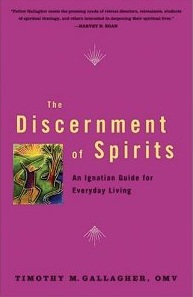 “The Discernment of Spirits: Setting the Captives Free” series is based on Fr. Gallagher’s book “Discern
“The Discernment of Spirits: Setting the Captives Free” series is based on Fr. Gallagher’s book “Discern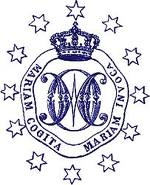 ment of Spirits” published by Crossroads Books.
ment of Spirits” published by Crossroads Books.
.
For more information on the work of Fr. Timothy Gallagher check out his website
.
For the other episodes in this series check out Fr. Timothy Gallagher’s “Discerning Hearts†page
Tags: evil, ewtn, spiritual formation, work
This entry was posted on Thursday, September 5th, 2013 at 8:34 am
You can follow any responses to this entry through the RSS 2.0 feed.
Episode 1 – Regnum Novum: Bringing forth the New Evangelization through Catholic Social Teaching with Omar Guiterrez – Introduction and Value # 1 – Jesus Christ
– Introduction and Value # 1 – Jesus Christ
[powerpress]
From episode … 1.     Jesus Christ
You may not believe how many advocates of social justice are only too ready to chuck Jesus out the window in order to get you to buy their plan. One such program of which I’m familiar actually includes materials that deny the divinity of Christ, several times, and deny the salvific work of the cross. As Pope Paul VI and Pope Benedict XVI have said, the Social Doctrine is evangelization. If it is not rooted in the truth, then it can be manipulated to mean whatever one wants it to mean. The truth is quite simply, Jesus Christ who, as Gaudium et spes states, reveals man to himself. The Social Doctrine and the work of charity must stem from an intimate knowledge of Jesus Christ so that they might serve the whole person and point back to Christ.
We live at a very special time. The confluence of many things has brought forth the clear need to be able to articulate the Social Teaching of the Catholic Church in a way that is accessible and applicable. This is not to be an effort where high-minded theories are to be bandied about. Rather, this is a time of opportunity wherein we can apply the Social Doctrine to the concrete so as to bring about a New Kingdom, a Revolution. – Omar G.Â
Discerning Hearts is blessed to present Omar F. A. Guiterrez, M.A. , Special Assistant  to Archbishop George Lucas of the Archdiocese of Omaha, in a groundbreaking series which breaks open the heart of Catholic Social Doctrine.
Tags: jesus christ, social doctrine, truth, work
This entry was posted on Wednesday, September 4th, 2013 at 8:17 am
You can follow any responses to this entry through the RSS 2.0 feed.
[powerpress]We are joined by the incredible Sr. Renee Mirkes, a Franciscan Sister of Christian Charity, 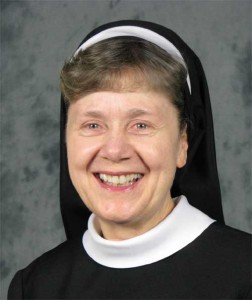 who is director of the Center for NaProEthics, the ethics division of the Pope Paul VI Institute. So many have already said so much about St. Teresa Benedicta of the Cross’  life, but to really honor her is to explore (the best we can)
who is director of the Center for NaProEthics, the ethics division of the Pope Paul VI Institute. So many have already said so much about St. Teresa Benedicta of the Cross’  life, but to really honor her is to explore (the best we can)  her incredible work.  Sr. Renee is someone who has.   Sr. Renee offers to us just the tip of the iceberg of St. Teresa Benedicta of the Cross’ tremendous legacy. Edith…brilliant. Sr. Renee…brilliant.
her incredible work.  Sr. Renee is someone who has.   Sr. Renee offers to us just the tip of the iceberg of St. Teresa Benedicta of the Cross’ tremendous legacy. Edith…brilliant. Sr. Renee…brilliant.
Tags: ethics, Renee Mirkes, work
This entry was posted on Friday, August 9th, 2013 at 12:09 am
You can follow any responses to this entry through the RSS 2.0 feed.
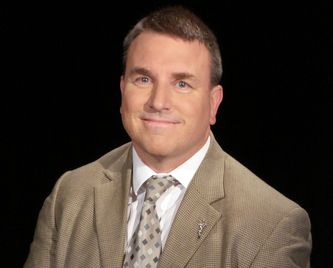 Episode 14 – Herman Melville  and “Moby Dick”  on Great Works in Western Literature with Joseph PearceÂ
Episode 14 – Herman Melville  and “Moby Dick”  on Great Works in Western Literature with Joseph PearceÂ
[powerpress]
A sea adventure, a study of evil, and a cast of fascinating characters, including the 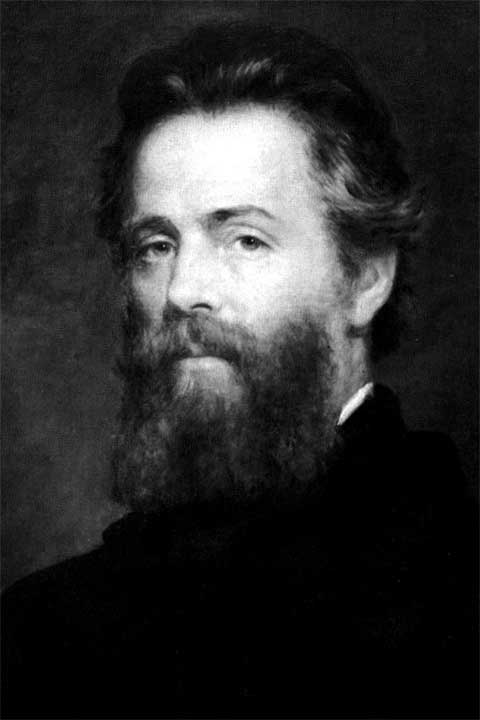 crazed captain who is obsessed with hunting down the whale that maimed him — Moby-Dick is all of this and more.
crazed captain who is obsessed with hunting down the whale that maimed him — Moby-Dick is all of this and more.
Based on the author’s experiences as a sailor, Herman Melville’s probing look into the human heart has been read and analyzed from every angle, including the most absurd. The tragic tale is looked at afresh in this Ignatius Critical Edition, which examines the background and other writings of the author and provides his essay on a work by his literary friend Nathaniel Hawthorne.
Based on the Ignatius Critical Edition, this series examines, from the Judeo-Christian perspective, the life,the times, and influence of authors of great works in literature .
Joseph Pearce  is currently the Writer-in-Residence and Visiting Fellow at Thomas More College of Liberal Arts in Merrimack, New Hampshire. He is also Visiting Scholar at Mount Royal Academy in Sunapee, New Hampshire. He is also Visiting Scholar at Mount Royal Academy in Sunapee, New Hampshire. , as well as co-editor of the Saint Austin Review (or StAR), an international review of Christian culture, literature, and ideas published in England (Family Publications) and the United States (Sapientia Press). He is also the author of many books, including literary biographies of Solzhenitsyn, J. R. R. Tolkien, C. S. Lewis, G. K. Chesterton, and Oscar Wilde.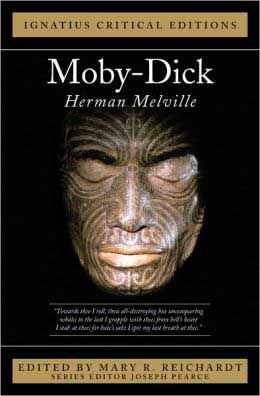
To learn more about the authors and titles available in the Ignatius Critical Editions
Tags: evil, heart, Ignatius Critical Edition, joseph pearce, nathaniel hawthorne, work
This entry was posted on Wednesday, July 24th, 2013 at 11:47 am
You can follow any responses to this entry through the RSS 2.0 feed.
[powerpress]
Glorious Saint Benedict,
sublime model of virtue,
pure vessel of God’s grace!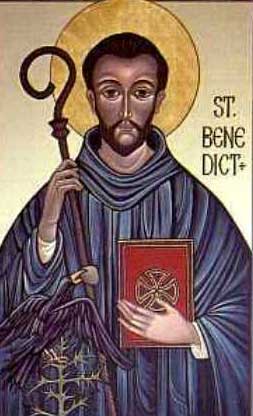
Behold me humbly kneeling at your feet.
I implore you in your loving kindness
to pray for me before the throne of God.
To you I have recourse in the dangers
that daily surround me.
Shield me against my selfishness
and my indifference to God and to my neighbor.
Inspire me to imitate you in all things.
May your blessing be with me always,
so that I may see
and serve Christ in others
and work for His kingdom.
Graciously obtain for me from God
those favors and graces
which I need so much in the trials,
miseries and afflictions of life.
Your heart was always full of love,
compassion and mercy toward those who were afflicted
or troubled in any way.
You never dismissed without consolation
and assistance anyone who had recourse to you.
I therefore invoke your powerful intercession,
confident in the hope that you will hear my prayers
and obtain for me the special grace and favor I earnestly implore.
(State your intention here…)
Help me, great Saint Benedict,
to live and die as a faithful child of God,
to run in the sweetness of His loving will,
and to attain the eternal happiness of heaven.
Amen.
Tags: benedictines, happiness, mercy, virtue, work
This entry was posted on Thursday, July 11th, 2013 at 5:27 am
You can follow any responses to this entry through the RSS 2.0 feed.




